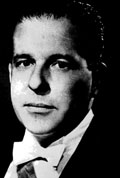João Belchior Marques Goulart was the son of a rich farmer and landowner, who commanded the troops in Rio Grande do Sul during the revolution of 1930, which brought to power Getúlio Dorneles Vargas originating from the same state. Goulart studied law and social sciences at Pôrto Alegre graduating in 1939, but he gave up a career of lawyer and was occupied with family business. In 1945 he unexpectedly found himself involved in politics when he met with Vargas, who resided close to Goulart's estates after his deposition. Goulart joined the Brazilian Labor Party (Partido Trabalhista Brasileiro, PTB) and was elected to the state legislature of Rio Grande do Sul (1947). One of the Goulart's estates, São Vicente, became a headquarters for Vargas's political activities in 1947-1950. Elected to the federal Chamber of Deputies (1950), Goulart took a leave (1951) to assume the office of secretary for the interior and justice in the government of Rio Grande do Sul. He returned to his seat in the Chamber as deputy in 1952-1953, 1954 and then served as minister of labor, industry and commerce (18 Jun 1953 - 23 Feb 1954). Goulart ran for vice president in the elections of 3 Oct 1955. During governmental crisis of November 1955, the Congress recognized the existence of impediment to discharge of functions of the president by João Café Filho, who was thought to be plotting against the installation of Juscelino Kubitschek de Oliveira and Goulart. After the Superior Electoral Tribunal approved the official results of the election on 7 Jan 1956, both assumed their offices on 31 Jan 1956. Again elected vice president on the ticket with Jânio da Silva Quadros (3 Oct 1960), Goulart was the first in line of succession when Quadros abruptly resigned (25 Aug 1961), but he was unable to assume the office as he was on a state visit to China. The military, who accused Goulart of radicalism, tried to prevent his installation as president. As a result of compromise between the Congress and the anti-Goulart group in the military, Brazil was transformed into a parliamentary republic (2 Sep 1961) with most presidential powers transferred to the head of government. Goulart took the oath of office on 7 Sep 1961, but he reluctantly accepted the reduction of his authority and used all his influence to discredit the parliamentary system. Political instability followed the resignation of the first cabinet, presided by Tancredo de Almeida Neves, and three other cabinets were replaced in six months. Appealing directly to the people, Goulart won more than 80 percent of the votes cast at a plebiscite (6 Jan 1963) and the Congress duly repealed the parliamentary system (23 Jan 1963). The conflict of Goulart with Governor of Guanabara State, Carlos Lacerda, and the military exacerbated when Goulart signed decrees expropriating oil refineries and uncultivated land owned by foreign companies. The appeal of Goulart to the Congress for granting him extraordinary powers to accelerate reforms was seen as attempt to install a leftist dictatorship. The governors of Guanabara and Minas Gerais openly supported the military revolt against Goulart, who fled to Pôrto Alegre (1 Apr 1964) and then to Uruguay. The Congress declared the office of president vacant on 2 Apr 1964. [2] |
| Candidate (party) |
Popular vote (3 Oct 1960) [3] |
| João Belchior Marques Goulart (Labor) |
4,547,010 |
| Milton Soares Campos (National Democratic) |
4,237,719 |
| Fernando Ferrari (Renewal Labor Movement) |
2,137,382 |
| blank |
1,305,865 |
| void |
358,378 |
|

